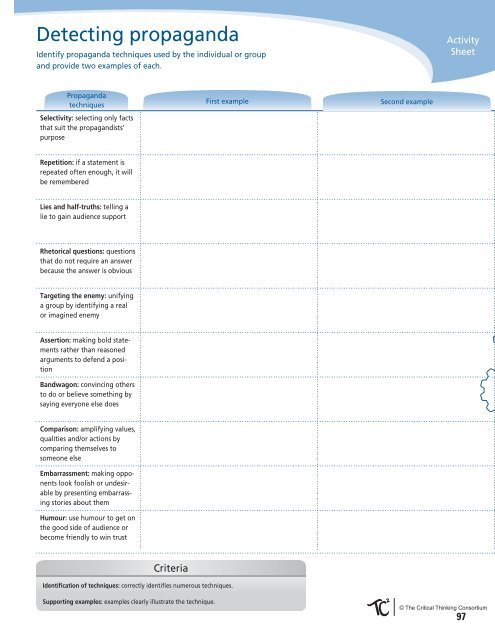Residential Residential
Residential_School
Residential_School
You also want an ePaper? Increase the reach of your titles
YUMPU automatically turns print PDFs into web optimized ePapers that Google loves.
Detecting propaganda<br />
Identify propaganda techniques used by the individual or group<br />
and provide two examples of each.<br />
Activity<br />
Sheet<br />
Propaganda<br />
techniques<br />
Selectivity: selecting only facts<br />
that suit the propagandists’<br />
purpose<br />
First example<br />
Second example<br />
Repetition: if a statement is<br />
repeated often enough, it will<br />
be remembered<br />
Lies and half-truths: telling a<br />
lie to gain audience support<br />
Rhetorical questions: questions<br />
that do not require an answer<br />
because the answer is obvious<br />
Targeting the enemy: unifying<br />
a group by identifying a real<br />
or imagined enemy<br />
Assertion: making bold statements<br />
rather than reasoned<br />
arguments to defend a position<br />
Bandwagon: convincing others<br />
to do or believe something by<br />
saying everyone else does<br />
Comparison: amplifying values,<br />
qualities and/or actions by<br />
comparing themselves to<br />
someone else<br />
Embarrassment: making opponents<br />
look foolish or undesirable<br />
by presenting embarrassing<br />
stories about them<br />
Humour: use humour to get on<br />
the good side of audience or<br />
become friendly to win trust<br />
Criteria<br />
Identification of techniques: correctly identifies numerous techniques.<br />
Supporting examples: examples clearly illustrate the technique.<br />
© The Critical Thinking Consortium<br />
97


